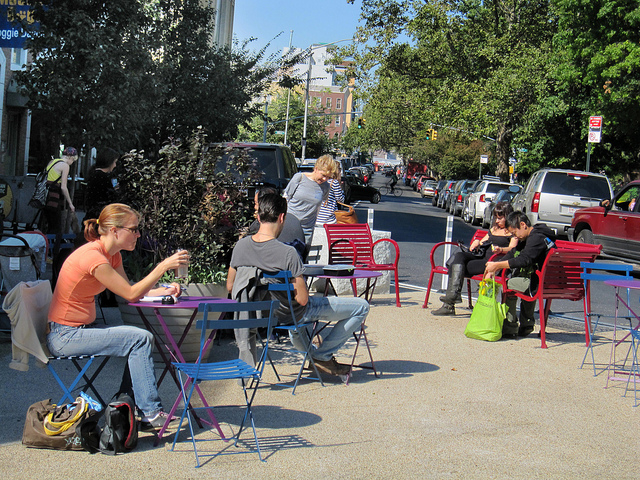While recent comments from Mayor de Blasio and Police Commissioner Bill Bratton about potentially yanking out the Times Square plazas have caused an uproar, a much deeper and more substantial debate over plazas has been simmering for months.

Public space advocates and plaza managers say the city's rules governing who can do what with plaza space are cumbersome and in need of an overhaul. Now, they're turning to City Hall to fix the problem.
Since the plaza program was launched seven years ago, DOT has required that each space be managed by a local partner. The rule makes sense: Without someone in charge of managing the space, plazas can quickly deteriorate, people will stop spending time there, and public support for them will wither. But the organizations that have signed on to manage plazas say they don't have enough leeway, under the current model, to do the job well.
There are two types of agreements between the city and plaza managers. One is a maintenance agreement that provides for limited sponsorships, like corporate logos on umbrellas, to help defray the partner organization's costs. The other is a license agreement, which allows vending, events, and other methods of generating more substantial revenue for the plaza partner.
Most plazas in Manhattan and nearby neighborhoods are managed by a local business improvement district and have both types of agreements. In addition to food concessions, these plazas can generate revenue by hosting large corporate promotional events that require approval from the mayor's Street Activity Permit Office, or SAPO.
Outside Manhattan, most plazas are sponsored by local merchants associations or neighborhood groups. They typically don't have the resources to attract corporate sponsorship or concessions, and have signed only a maintenance agreement, not a license agreement, with DOT. That means that for the most part, they don't host events that generate revenue. But they do put on smaller events like performances or pop-up libraries -- and each time they have to navigate a cumbersome process with SAPO.
“The groups that I work with, none of them have that second-level agreement,” said Laura Hansen, managing director of the Neighborhood Plaza Partnership, a project of the Horticultural Society of New York that helps plaza partners with less resources than the big BIDs. "They’re all really struggling with how to generate revenue."
Yesterday, NPP sent a letter to Mayor Bill de Blasio [PDF] asking him to ensure that "all plazas will flourish under a regulatory framework that recognizes and nurtures the unique contributions they are making to the city."
The managers of both the well-financed plazas and the smaller plazas say the current SAPO process is a barrier to effective public space management, creating too much red tape. The fewer hoops they have to jump through, the better they can program the spaces they oversee.
The letter Hansen sent this week echoes an effort by the NYC BID Association, which sent a letter to Transportation Commissioner Polly Trottenberg last December that recommended creating a new Assistant Commissioner of Public Space position within DOT, giving plaza partners more discretion to manage concessions, and reforming the SAPO rules governing event permitting [PDF].
The BID Association has also set up a plaza working group that meets regularly with DOT. Hansen wants to make sure these discussions reflect the needs of the smaller plaza managers she represents.
Hansen is adamant that the key to better plazas is reforming the management agreements between the city and its local partners -- and not turning the plazas over to the Parks Department, as the Daily News has called for with Times Square. Shifting those plazas from DOT to Parks would allow for more aggressive policing of the desnudas and costumed characters that the press have been obsessing over, but that would entail significant drawbacks.
Putting plazas under the purview of the Parks Department would be a mistake, said Hansen, since DOT has already built up years of experience with plaza management. Parks also have regulations and hours of operation that are more restrictive than the rules governing streets. Clearing the way for more citations to the desnudas, in other words, would actually create more obstacles to good public space management.
Instead of exporting plazas from DOT to Parks, Hansen thinks there are some Parks practices that should be imported into the DOT plaza program. Parks conservancies, for instance, have much greater leeway to program events than plaza managers currently do. "The DOT needs a framework that mirrors parks, but keeps them streets," Hansen said. “They should definitely not be in Parks. DOT is the right agency to regulate them, but they need some more tools.”
"These problems are solvable," Hansen said. "The plazas are worth it. They are community assets. They do a lot for neighborhoods, and so we should be careful about this kind of hyperbole about just getting rid of them."





